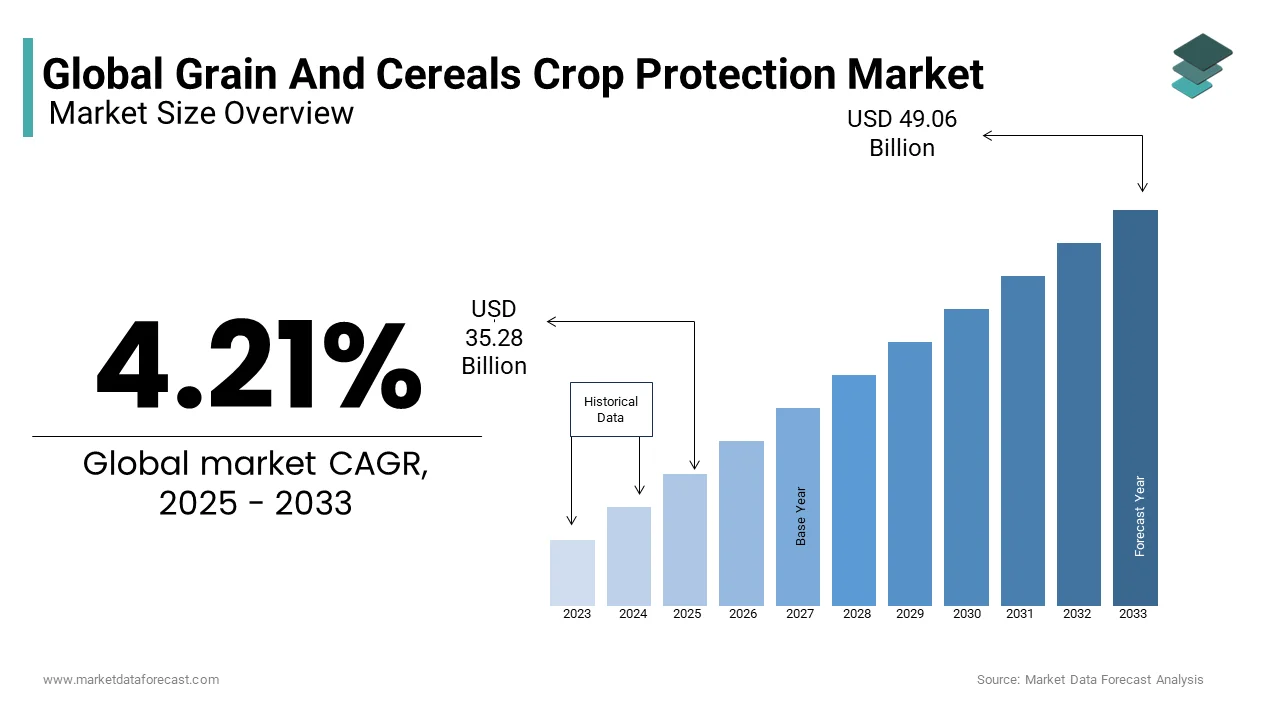Global Grain And Cereals Crop Protection Market Size, Share, Trends, And Growth Forecasts Report, Segmented By Product Type (Herbicides, Fungicides, Insecticides, Others Pesticides), Form (Synthetic Pesticides, Bio Pesticides, Others), Distribution Channel (Retailers, Online, Convenience Stores, Others), And By Region (North America, Europe, Asia Pacific, Latin America, and Middle East and Africa), Industry Analysis From 2025 to 2033
Global Grain and Cereals Crop Protection Market Size
The global grain and cereals crop protection market was valued at USD 33.85 billion in 2024 and is anticipated to reach USD 35.28 billion in 2025 from USD 49.06 billion by 2033, growing at a CAGR of 4.21% during the forecast period 2025 to 2033.

Crop protection is the subject of dealing with plant science and the practice of managing plant diseases, weeds, and other pests that damage crops and forestry, which leads to a decrease in crop production. Various factors such as soil erosion, urbanization, land pollution, and climatic conditions have led to a reduction in the size of arable land. This reduction has subsequently forced farmers to increase the crop yield from the limited size of the arable land, where they started using crop protection chemicals, which help enhance the yield and quality of crops.
Cereals and grains are the most farmed crops all over the world because they are more durable than other staple foods. Maize, Rice, Wheat, Barley, Oats, Millet, and Rye are some of the most farmed crops in cereals. There are various pesticide-based approaches, such as herbicides, insecticides, and fungicides, to control pests or weeds. Although pesticides have various advantages, they have some drawbacks, such as potential toxicity to humans and other species and environmental concerns. An increase in technological advancements in farming techniques, such as crop protection and soil management, is increasing crop yield.
MARKET DRIVERS
Growing demand for high-quality, nutritious food like cereals and grains, increasing population and decreasing arable lands, increasing consumer awareness about pesticide consumption, growth in demand for biopesticides, Government initiatives for the use of biopesticides because of their low toxicity, greater safety, and higher effectiveness in controlling pests, product innovations and technological advancements are driving the growth of Global grain and cereal crop protection market. However, research and development costs, toxicity on humans and livestock, stringent rules by authorities, and specific fruits and vegetables have resulted in increasing sugar levels of individuals, which can have serious consequences for diabetics, and rising crop protection alternatives like biotechnology and genetic engineering.
REPORT COVERAGE
|
REPORT METRIC |
DETAILS |
|
Market Size Available |
2024 to 2033 |
|
Base Year |
2024 |
|
Forecast Period |
2025 to 2033 |
|
CAGR |
4.21% |
|
Segments Covered |
By Product, By Distribution Channel, By Distribution Form |
|
Various Analyses Covered |
Global, Regional & Country Level Analysis, Segment-Level Analysis, DROC, PESTLE Analysis, Porter’s Five Forces Analysis, Competitive Landscape, Analyst Overview on Investment Opportunities |
|
Regions Covered |
North America, Europe, APAC, Latin America, Middle East & Africa |
|
Market Leaders Profiled |
Bayer Crop Science, FMC, Adama Agricultural Solutions, DuPont, BASF SE, Dow Agro Sciences, Syngenta International, Nufarm, Valent Biosciences, Monsanto Company, Arysta Life Science, Natural Industries, IsAgro Spa. |
REGIONAL ANALYSIS
The market has also been geographically segmented into North America, Europe, Asia-Pacific, Latin America, and the Middle East & Africa. North America, followed by Asia Pacific and Europe, has the largest revenue due to the demand for grain and cereal crop protection products and the presence of large pesticide manufacturing companies. The Asia Pacific is anticipated to have the fastest growth rate due to the growing population, increasing consumption of food products, and consumer awareness about health and wellness in developing countries such as India, China, and Japan.
KEY MARKET PLAYERS
Bayer Crop Science, FMC, Adama Agricultural Solutions, DuPont, BASF SE, Dow Agro Sciences, Syngenta International, Nufarm, Valent Biosciences, Monsanto Company, Arysta Life Science, Natural Industries, IsAgro Spa. These are some of the market players that dominate the global grain and cereals crop protection market.
MARKET SEGMENTATION
This research report is on the global grain and cereals crop protection market. It is segmented and sub-segmented into the following categories.
By Product
- Herbicides
- Fungicides
- Insecticides
By Distribution Channel
- Retailers
- Online
- Convenience stores
By Distribution Form
- Synthetic pesticides
- Biopesticides
By Region
- North America
- Europe
- Asia Pacific
- Latin America
- Middle East and Africa
- Rest of the World
Related Reports
Access the study in MULTIPLE FORMATS
Purchase options starting from
$ 2500
Didn’t find what you’re looking for?
TALK TO OUR ANALYST TEAM
Need something within your budget?
NO WORRIES! WE GOT YOU COVERED!
Call us on: +1 888 702 9696 (U.S Toll Free)
Write to us: sales@marketdataforecast.com